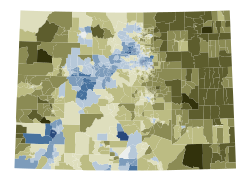National Popular Vote Interstate Compact Referendum | ||||||||||||||||||||||
| Results | ||||||||||||||||||||||
|---|---|---|---|---|---|---|---|---|---|---|---|---|---|---|---|---|---|---|---|---|---|---|
| ||||||||||||||||||||||
| ||||||||||||||||||||||
| Source: Associated Press [1] | ||||||||||||||||||||||
| Elections in Colorado |
|---|
 |
2020 Colorado Proposition 113 was a ballot initiative approved by voters in Colorado as part of the November 3, 2020 United States elections. The proposition was to join the National Popular Vote Interstate Compact. [2]

